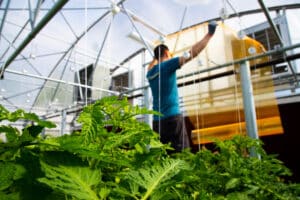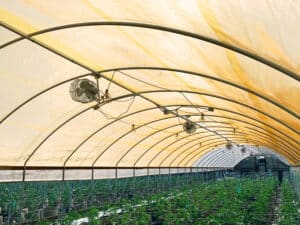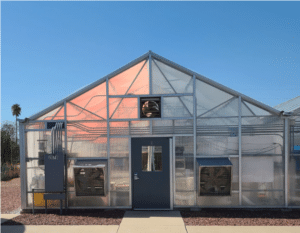
IPM for Sustainable & Successful Cannabis Cultivation
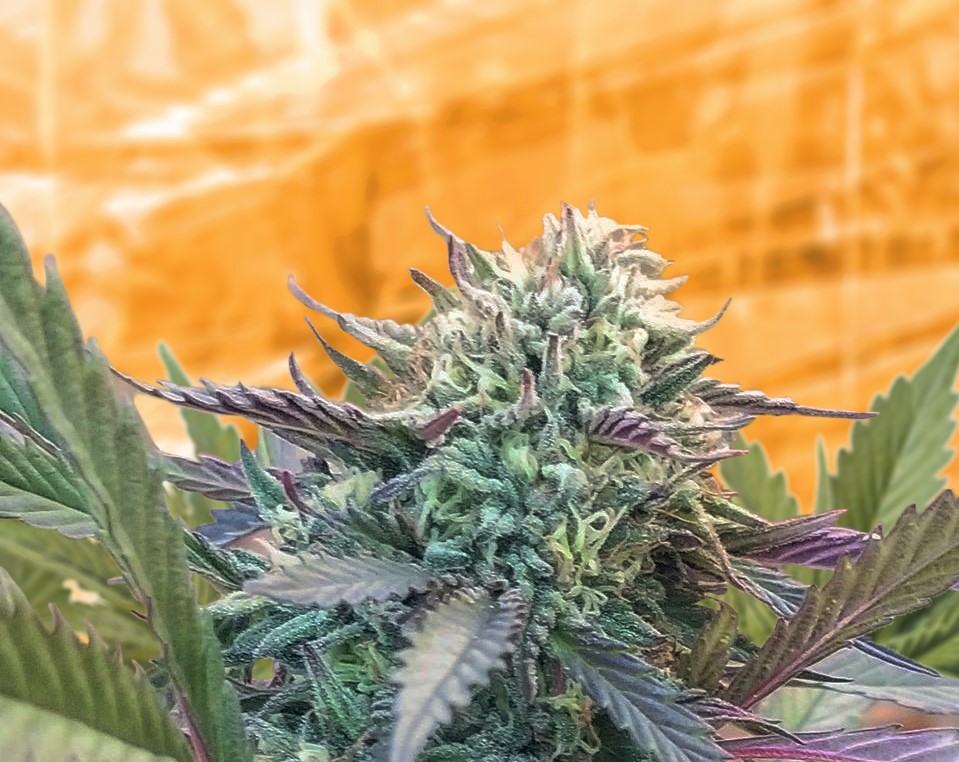
In the ever-evolving landscape of cannabis cultivation, Integrated Pest Management (IPM) has emerged as an indispensable practice. It’s not just about growing cannabis, it’s about cultivating it sustainably and effectively with IPM for cannabis. With the demand for high-quality cannabis products on the rise, and the need for environmentally responsible practices more critical than ever, IPM for sustainable cannabis cultivation stands as an essential routine practice for sustainable growth.
This blog will delve into the myriad benefits of IPM in cannabis cultivation, unveiling its ability to:
- revolutionize pest management
- lower costs
- elevate crop quality
- contribute to environmental well-being
By the time you’ve navigated through this article, you’ll not only understand the significance of IPM, but you will also be equipped with actionable insights to seamlessly incorporate it into your cannabis cultivation journey.
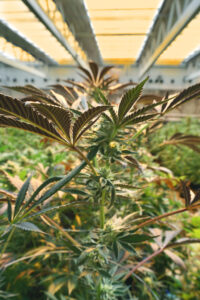 Effective Pest Management:
Effective Pest Management:
Integrated Pest Management is the embodiment of proactive pest control. Instead of waiting for pest issues to reach critical levels, IPM empowers growers to monitor crops closely and detect problems in their infancy. This vigilant surveillance allows for precise and timely interventions, reducing the need for reactive pesticide usage.
When our UbiGro team attended GreenTech Amsterdam 2023, we found an overarching ideology from speakers at the conference:to embrace solutions designed to revolutionize your greenhouse environment Integrated Pest Management is a perfect example of this idea. Embracing the principles of IPM involves introducing beneficial insects and natural predators into your garden or greenhouse ecosystem. These allies maintain a balance by preying on unwanted pests, preventing infestations from spiraling out of control, and promoting overall plant health.
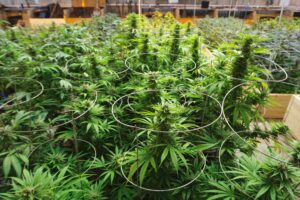 Reduced Costs and Chemical Exposure
Reduced Costs and Chemical Exposure
A pivotal advantage of IPM in cannabis cultivation is its cost-effectiveness and the reduction of chemical exposure. By diminishing reliance on chemical pesticides, growers can optimize their budget, channeling resources where they matter most.
Moreover, limited pesticide use translates into lower chemical residues on harvested plants. This ensures product safety and meets the strict quality standards expected by the industry and consumers alike. The dual benefit of cost reduction and lower chemical exposure not only safeguards the environment but also enhances consumer confidence in the products they consume on a daily basis.
Improved Quality and Yield:
IPM doesn’t just protect cannabis plants; it nurtures them to thrive. By averting infestations and diseases, plants are unburdened and able to channel their energy into robust growth and production. The ensuing health benefits translate into amplified yields and superior product quality. This results in cannabis exhibiting visual allure andrich in aromatic compounds and cannabinoids, delivering an unmatched experience for consumers.
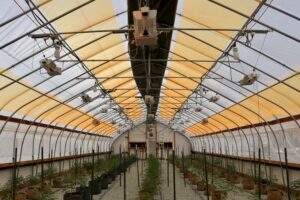 Environmental Stewardship
Environmental Stewardship
Modern cannabis cultivation comes with an environmental responsibility. IPM aligns seamlessly with this ethos, representing a sustainable and ecologically conscious practice. By reducing pesticide usage, IPM cuts back on chemical footprints in soil, water, and the broader environment. This, along with other eco-friendly approaches, preserves ecosystems, fosters biodiversity, and upholds the overarching health of our planet. This is a testament to the holistic impact of IPM.
Implementing an Effective IPM Program in Cannabis Cultivation:
Regular Plant Monitoring
The IPM journey commences with diligent plant monitoring. Carve out time for regular visual inspections of your cannabis plants, meticulously scrutinizing for signs of pests, diseases, or stress. Consider investing in magnification tools or software to ensure a comprehensive assessment. If this sounds like too much of a chore to take on yourself, there are services available for growers in the industry. We have linked some great resources later in this article.
The rapid identification of issues is pivotal in reducing their impact and maintaining a flourishing crop. Be sure to look out for issues such as: leaf spot, mildew, blight, wilt, canker, root rot, etc. before accurately diagnosing the problems.
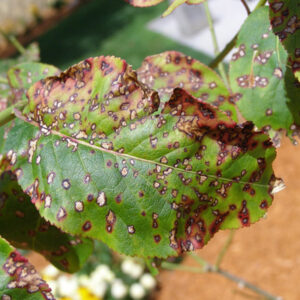 [example of leaf spot] [example of leaf spot] | 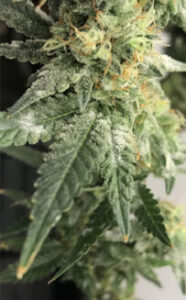 [example of mildew] [example of mildew] | 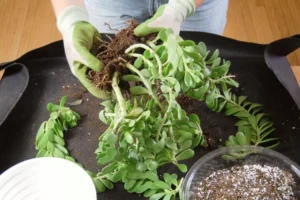 [example of root rot] [example of root rot] |
Exploring Biological Control Options
The integration of beneficial insects and natural predators forms the crux of IPM’s success. Invite allies like ladybugs and lacewings into your growing space. These predators feast on harmful pests, creating a harmonious ecosystem where pest populations are naturally kept in check. This symbiotic relationship fosters an environment where both predators and plants flourish.
Using beneficial insects for your cannabis grow is a commercial industry and services do exist for growers within the space. If you are interested in moving towards a more sustainable cultivation, here are some other great resources to reference:
- Predators Over Pesticides: An Introduction to Chemical-Free Pest Control
- The Best Bugs Or Insects For A Cannabis Grow
- Optimizing Pest Control in Ornamental Crops: Choosing the Right Predatory Mite
Implementing Cultural Controls
Cultural controls form the backbone of IPM’s proactive philosophy. Practices such as crop rotation and meticulous sanitation are integral. Crop rotation disrupts pest life cycles and reduces disease buildup in the soil. Sanitation entails the removal of debris and infected plant material, which collectively act as barriers to pest and disease propagation. These measures aren’t just methods; they’re the embodiment of preventive care for your crop.
Strategic Pesticide Use as a Last Resort
While IPM champions non-chemical interventions, there might be instances where pesticide use is the last resort. In such scenarios, select pesticides approved for cannabis cultivation, and adhere rigorously to label instructions and safety protocols. Responsible pesticide use not only protects your plants but also upholds the broader environmental ethos of IPM.
Conclusion
Integrated Pest Management (IPM) for cannabis stands as a testament to the evolution of cannabis cultivation. It’s a paradigm shift that encapsulates proactive strategies, sustainable practices, and an unwavering commitment to plant health. As the cannabis industry continues its transformative journey, the principles of IPM for cannabis are poised to shape its trajectory.
By embracing IPM for cannabis, you aren’t just growing cannabis; you’re nurturing a legacy of quality, sustainability, and ecological stewardship. It’s a journey that empowers your plants, elevates consumer experiences, and contributes to a greener, healthier world. The time to embrace the power of IPM for sustainable cannabis cultivation is now.
Looking to learn more about other sustainable greenhouse practices? Talk to one of our greenhouse light experts today!

Tyler Veyna
Tyler brings 15 years of experience in Greenhouse production and facility management of a wide range of crops in multiple states to the UbiGro team. Based in Salinas, California. “Being a fourth-generation farmer, I look to improve and empower the grower, and with UbiGro, we can do just that."
Share:
Connect With Us
Company
Resources
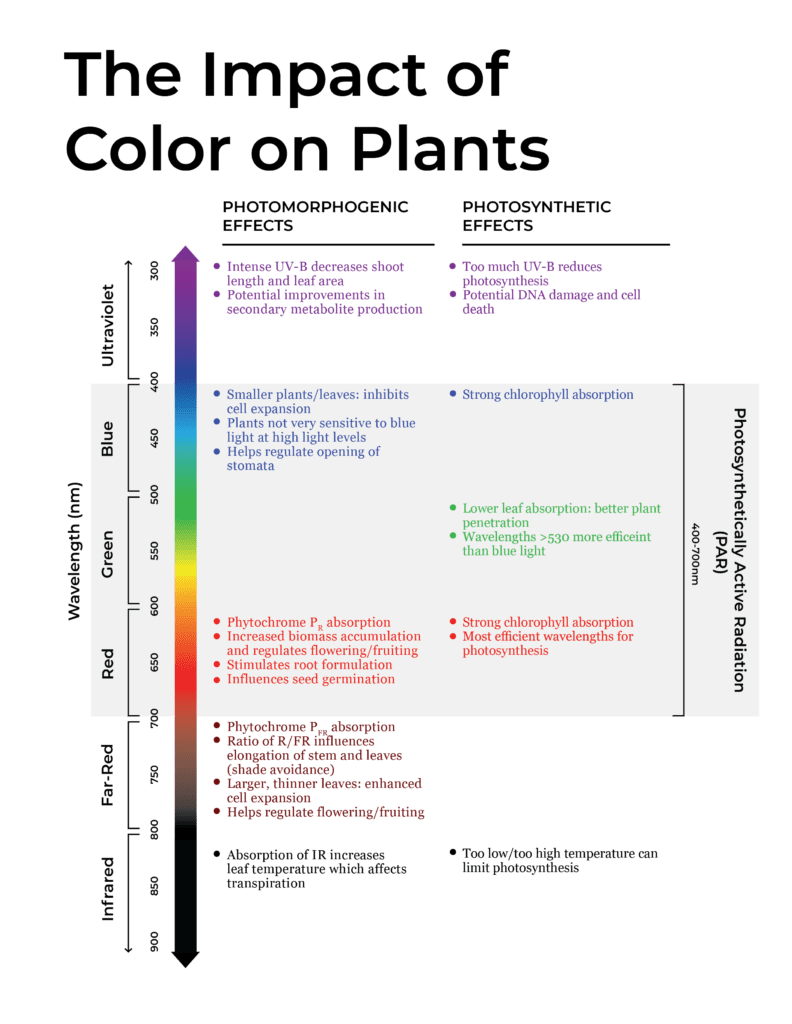

Hunter McDaniel, PhD
Founder & CEO
Hunter earned a Ph.D. in Materials Science and Engineering at the University of Illinois at Urbana-Champaign, before joining Los Alamos National Laboratory in the Chemistry Division. Ultimately the value proposition of UbiGro is about boosting crop yields and quality without the cost or energy impact of lighting. Hunter has more than fifty publications and patents, and more than 2000 total citations, h-index: 20. Hunter fundamentally believes that novel materials underpin every significant technology advancement, and he is focused on leveraging new materials to have a lasting and sustainable impact.

Damon Hebert, PhD
Director of Agriculture
Damon brings a wide range of experience in agriculture, materials science, spectroscopy, and small business. During his time in Prof. Angus Rockett’s research group at The University of Illinois at Urbana-Champaign (UIUC), Hebert authored a doctoral thesis and multiple papers on the materials science of CIGS semiconductor materials, which is closely related to the materials developed at UbiQD. He also served as a consultant to Nanosolar, a CIGS nanocrystal solar cell manufacturing company. Hebert has industry experience having co-founded Dr. Jolly’s, a leading cultivation and distribution operation in Bend, OR.

Tania Lafaille
Sales Representative
Tania is a UbiGro Sales Representative, with over 7 years of experience in product sales (specifically berries and avocados) covering all of North America and parts of South America. While in agriculture, Tania has cultivated strong relationships with growers and distributors, granting her a unique insight into both perspectives. That understanding, paired with her fierce dedication to results, drives her fun and fiery commitment to her craft. Tania is based in Gilroy, CA.

Tyler Veyna
Sales Representative
Tyler brings 15 years of experience in Greenhouse production and facility management of a wide range of crops in multiple states to the UbiGro team. Based in Salinas, California. “Being a fourth-generation farmer, I look to improve and empower the grower, and with UbiGro, we can do just that.”

Jim Gideon
Sales Manager
Jim Gideon is an UbiGro Sales Manager, with over 25 years of greenhouse industry sales experience covering all of North America. Previously Jim has worked for Green Tek, Plazit-Polygal, Texel, Cherry Creek, and Nexus. He is based in Montgomery, AL, and Jim believes that “light is everything to the grower.”

Eric Moody
Director of Sales
Eric Moody is UbiQD’s Director of UbiGro Sales. Eric has more than 6 years of experience in horticulture lighting industry, building relationships with greenhouse growers of all sizes and crops on optimal lighting for their growing operation, and most recently managed a North American sales team for PL Light Systems. Overall, Eric has been in sales leadership positions for more than 13 years. Eric brings with him a great understanding of the market and available technologies for growers, greenhouse facilities, and sales leadership. Reach Eric by phone at 541-490-6421 or by email at [email protected].

Mike Burrows, PhD
Dr. Michael Burrows is UbiQd’s Vice President of Business Development. His educational background includes a Materials Science doctorate from the University of Delaware and an MBA from Duke University Fuqua School of Business. His career has specialized in the commercialization of novel electronic materials in venture-run programs for different industries including solar, biosensors, and the automotive industry. In both start-up and corporate environments, he has extensive experience in global market development, foraging supply chain partnerships, productization, and brand building. He is currently leading UbiQD’s partnership efforts in luminescent greenhouse technology, smart windows, and security ventures.

Matt Bergern, PhD
Cheif Product Officer
As Chief Product Officer at UbiQD, Dr. Matt Bergren leads the company’s product development efforts, sales, and product manufacturing, including the company’s first commercial agriculture product, UbiGro. He plays a critical role in continuing the company’s path of technology development and vision of powering product innovations in agriculture, clean energy, and security.
He serves as the principal investigator for UbiQD’s contract with NASA, focused on tailoring the solar spectrum for enhanced crop production for space missions. Dr. Bergren’s leadership experience includes serving on the board of directors for the New Mexico Energy Manufacturing Institute, focused on job creation in New Mexico’s energy, and related manufacturing community.
